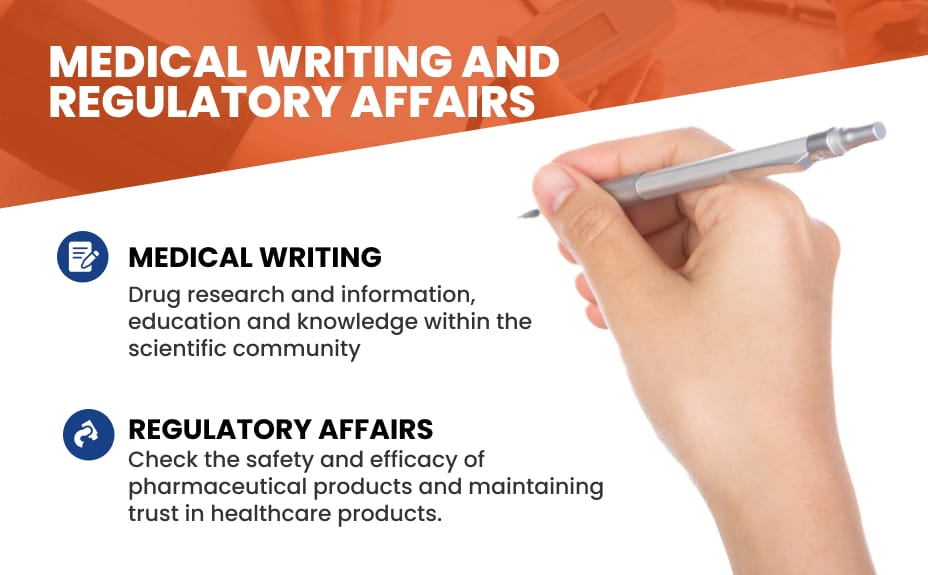The intricacies of medical writing vs. regulatory affairs reveal an intersection of science, communication, and law, pivotal to the healthcare industry’s backbone. At its core, medical writing focuses on crafting well-researched, clear, and concise documents related to drugs, devices, and biologics, while regulatory affairs professionals work on the frontline, making sure these medical innovations comply with stringent regulatory standards worldwide.
Understanding the nuanced differences and synergies between these two fields is crucial for career aspirations or your general knowledge of the development process of medicine and medical devices.
What is Medical Writing?
Medical writing services are the cornerstone of healthcare communication, embodying the synthesis of scientific knowledge with the art of clear and effective communication. This discipline involves creating detailed, accurate, and comprehensible documents that convey critical medical information to various audiences, from healthcare professionals to patients.
Definition and Scope of Medical Writing
Medical writing encompasses a wide range of documents related to medicine and healthcare. This includes, but is not limited to, marketing applications, Investigational New Drug (IND) applications, Clinical Study Reports (CSRs), non-clinical and clinical pharmacology summaries and overviews, and many more. A medical writer’s role is pivotal in developing, approving, and marketing pharmaceuticals and medical devices, ensuring that complex medical information is presented clearly and concisely.
Key Responsibilities of a Medical Writer
- Creating Clinical Trial Documents: Medical writers are instrumental in drafting and revising documents that form the backbone of clinical trials, such as protocols, informed consent forms, study reports, and summary documents for regulatory submission. These documents must be scientifically accurate and comply with international regulations and guidelines.
- Writing Scientific Papers, Abstracts, and Posters: Sharing research findings with the scientific community is a critical part of medical research. Medical writers prepare manuscripts for peer-reviewed journals, abstracts for conferences, and posters that succinctly present research data and findings.
- Developing Patient Education Materials: Beyond the scientific community, medical writers also create materials to educate patients about diseases, treatments, and health management. These materials must be accessible, accurate, and adapted to the patient’s level of understanding.
Required Skills and Qualifications for Medical Writers
Scientific knowledge and exceptional writing skills are essential to excel in medical writing. Here’s what it takes:
- Educational Background: A degree in life sciences, pharmacy, medicine, or a related field provides the foundational knowledge to understand complex medical concepts.
- Writing and Communication Skills: Proficiency in written communication, with the ability to present information clearly and persuasively to different audiences, is paramount.
- Attention to Detail: Precision and meticulousness are crucial, as clinical research documents must be free from errors and accurately reflect data and outcomes from clinical research.
- Understanding of Regulatory Guidelines: Knowledge of the regulatory environment, including guidelines from the FDA (U.S. Food and Drug Administration) and EMA (European Medicines Agency), is vital for preparing compliant documents.
- Continual Learning: The medical and regulatory landscapes are continuously changing, requiring medical writers to learn and adapt constantly.

Exploring Regulatory Affairs
Regulatory affairs is a critical and dynamic field within the pharmaceutical and healthcare sectors, acting as the compass that guides the safe and effective development, testing, approval, and monitoring of medical products. This sector ensures that companies adhere to all the legal and regulatory standards required by government agencies worldwide.
Definition and Significance of Regulatory Affairs
Regulatory affairs oversee how pharmaceuticals, medical devices, and other healthcare products are developed, tested, manufactured, and marketed to meet the required safety and efficacy standards set by governments and international bodies.
Primary Responsibilities of Regulatory Affairs Professionals
Professionals in regulatory affairs have a broad and impactful range of responsibilities. They are the linchpins in guaranteeing compliance with global regulations, which involves a deep understanding of legal and scientific requirements and how they apply to the lifecycle of healthcare products.
Managing submissions for drug approval processes is a critical task. This includes preparing detailed documentation for regulatory agencies and outlining new products’ safety, efficacy, and quality.
Another regular duty is to liaise with regulatory agencies like the FDA, the EMA, and other international entities. These professionals act as the crucial interface between their company and the regulatory bodies, negotiating and communicating to facilitate product approvals and ongoing compliance.
Necessary Skills and Qualifications for a Career in Regulatory Affairs
Here are some skills people seeking a career in regulatory affairs should have:
- Educational background in life sciences, pharmacy, medicine, or a related field
- An understanding of regulatory guidelines and laws
- Analytical skills
- Communication skills
- Strategic thinking and problem-solving skills

Key Differences Between Medical Writing and Regulatory Affairs
The healthcare industry relies on medical writing and regulatory affairs for drug development and patient care, yet these roles differ significantly in focus, tasks, and required expertise.
Daily Tasks and Responsibilities
Medical writing involves creating scientific documents such as CSRs, regulatory and research-related documents, and other scientific documents that describe the research results, product use, and medicinal information.
Regulatory affairs focuses on compliance with global regulatory guidelines through the drug development process, managing regulatory submissions, and communicating with regulatory agencies to secure product approvals.
Educational Background and Skill Sets
Medical writing requires a strong foundation in life sciences or a related field, coupled with excellent writing skills. A background in life sciences, medicine, or pharmacy is typical, along with specialized training in writing.
Regulatory affairs professionals typically have a background in life sciences or pharmacy, with a deep understanding of regulatory laws and guidelines. Skills in analytical thinking, project management, and strategic planning are crucial.
Impact on Drug Development and Patient Care
Medical writing is key in communicating drug research and information, impacting education and knowledge dissemination within the scientific community and beyond.
Regulatory affairs check the safety and efficacy of pharmaceutical products, safeguarding public health and maintaining trust in healthcare products.
Medical Writing and Regulatory Affairs Similarities
The collaboration between medical writing and regulatory affairs is crucial for navigating the complex pathways that bring healthcare innovations from conception to market. This partnership confirms that pharmaceutical products not only meet rigorous regulatory standards but also reach patients safely and efficiently.
How Medical Writing Supports Regulatory Submissions
Medical writing lays the groundwork for regulatory submissions, crafting the narrative that conveys critical scientific data to regulatory bodies. This involves drafting detailed clinical study reports that encapsulate the methodology, findings, and significance of clinical research, providing a solid basis for regulatory review.
Medical writers also prepare summaries and overviews, distilling complex data into concise documents highlighting a product’s safety, efficacy, and quality. Additionally, they make sure that all documentation complies with the specific regulatory requirements, aiding in a smoother review and approval process.
The Role of Regulatory Affairs in Guiding Medical Documentation Standards
Conversely, regulatory affairs professionals set the benchmarks for medical documentation, guiding the creation of submissions that adhere to current regulations and guidelines. They are responsible for ensuring that documents prepared by medical writers meet the high standards demanded by regulatory agencies such as the FDA and EMA. This includes reviewing submissions for scientific accuracy, regulatory compliance, and completeness.
Regulatory affairs navigate the feedback from regulatory bodies, collaborating with medical writers to refine and revise documentation in response to queries or requirements set forth during the review process.
The Integral Roles of Medical Writing and Regulatory Affairs
Medical writing and regulatory affairs are foundational to healthcare innovation, each playing a crucial role in the journey of medical products from concept to market. Together, they ensure the scientific integrity and regulatory compliance necessary for patient safety and public health.
As the healthcare landscape evolves, the synergy between these disciplines will remain vital in efficiently delivering new treatments to patients. For professionals in these fields, understanding their interdependent roles offers a pathway to impactful careers in healthcare.

